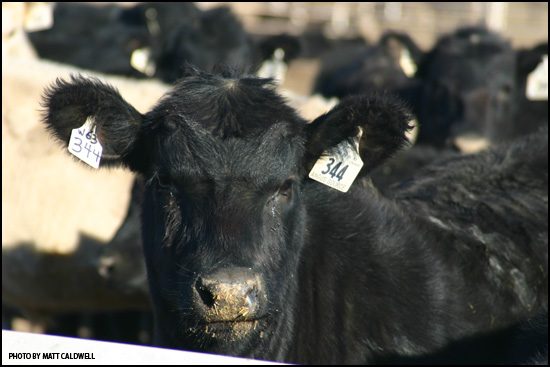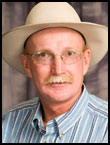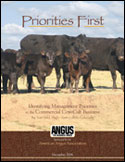MANAGEMENT...

Favorable Feeding Conditions
Favor Beef Quality
Cattle feeding conditions vary by location. One yard might be knee-deep in snow, while the other is dealing with piles of mud. Record-high temperatures might cause heat stress in one area while cattle in another region are enduring torrential rainfall.
Even with all that variability, one fact rings true: Better conditions mean better beef quality.
In a research review, Larry Corah and Mark McCully of Certified Angus Beef LCC (CAB) point to several factors that have caused quality grade to rebound 7.5 percentage points in just two years, following a 30-year decline. Read more.

Ron Torell
Back to Basics
Self-discipline and ranch management.
With the New Year upon us, perhaps we should all make a resolution to be more disciplined in 2010 and beyond. In large part, the future of our farms and ranches depends on it. Discipline is truly a tough order to follow.
Self-discipline is the ultimate key to achieving any goal and realizing any dream — whether it is losing weight, improving relationships, eliminating debt, building wealth or, certainly, managing a business such as your ranch. The financial margin of error for agriculture for the immediate future is pretty slim. Survival will require self-discipline. To quote William Ward, "The price of excellence is discipline. The cost of mediocrity is disappointment." In this edition of "Back to Basics" let's discuss areas of self-discipline and techniques that could be incorporated into the management of your operation. Read more.
Ag Producers Should Do Income Tax Planning
It is best to try to spread out income and expenses so you don't have abnormally high or low income or expenses in any one year.
Agricultural producers should do tax planning before the end of the year. If it's too late this year, it's a good reminder to start planning early next year.
It is best to start with year-to-date income and expenses and estimate them for the remainder of the year. Do not forget any income that was deferred to 2009 from a previous year. Also, depreciation needs to be estimated. It is best to try to spread out income and expenses so you don't have abnormally high or low income or expenses in any one year. Caution should be used in deferring too much income because it may push you into a higher tax bracket in a future year. Read more.
Tax Law Changes Bring Opportunity,
Confusion for Farmers
Take the time to develop a tax management strategy.
Changes in U.S. tax laws may cause some confusion for farmers, but Purdue University agricultural economist George Patrick said it's all about developing a tax management strategy that is most beneficial to each farm.
"The tax law changes have been almost continuous for a number of years," Patrick said. "We also had an extension of some of the laws from 2008 into 2009, which will primarily affect depreciation and expensing options." Read more.
Changing CO2 Promises Surprising
Changes in Plant Communities
High carbon dioxide (CO2) levels — an important contributor to global warming — have changed the botanical composition of the world's grasslands, farms and urban landscapes by increasing the growth, reproduction or survival of some species more than others. The greatest changes may have already happened, so studies of past effects offer clues to future surprises. Read more.

Kris Ringwall
Beef Talk
The utilization and incorporation of animal identification within a herd is best left as an individual decision.
At a recent meeting, the only item on the agenda was to determine what to print on next year's ear tags. What made the meeting exciting were the new tags the printing was going on.
Animal identification is not new. North Dakota Beef Cattle Improvement Association members have been tagging (identifying) cattle since 1963. The Dickinson Research Extension Center has been conducting research on cattle tags for nearly a decade.
In reality, animal identification (ID) has been around since animals were domesticated and will continue as long as we own animals.
In the beef industry, some will say that every tag should have a cow attached. However, not everyone will agree. In fact, some producers actually get a little irritated. Read more.
Cut Winter Feed Costs by Culling Cow Herd
Extension beef nutritionist says feed costs always matter.
Beef herd owners can cut winter feed costs by not feeding unproductive cows.
"Culling is step one," said Justin Sexten, University of Missouri (MU) Extension beef nutritionist. "Sell cows that are not going to produce a calf."
A nonpregnant cow will take 488 days to return her first paycheck, Sexten told beef producers at the Kirksville Livestock Symposium Dec. 5. "Do the math before you decide to keep her. Think about how much feed she will eat before she pays back." Read more.
Cold Stress in Newborn Calves
Calves chilled at birth have poor survival rates if they don't ingest colostrum quickly, and they can't suckle once the mouth gets cold. Even if you tube a calf, its ability to absorb antibodies diminishes if it is severely cold.
"He doesn't have energy for cellular functions to work properly," explains veterinarian James England of the University of Idaho Caine Center. "A cold calf has used up all his brown fat and the little bit of protein in the amniotic fluid in his stomach. Motility of the GI tract is also impaired. There's also a direct correlation between suckle reflex and uptake of antibodies. Suckling makes the calf several times more able to absorb the globulins than if you give colostrum via tube." Thus, it's crucial to help a calf nurse the cow or feed it a bottle before it becomes too chilled.
Calves born to thin cows may have less ability to keep warm in cold weather. Pregnant cow diets low in energy have a detrimental effect on calf viability at birth. Energy level in late gestation and how much brown fat the dam puts into the developing calf has an effect on the newborn calf's ability to generate body heat.
New Products
Industry affiliates provide a wide array of products and services to assist you on the farm and ranch. Here's an assortment of new products to hit the market in the last few months.
• EcoDrum composter available in the Midwest
• Technical publications can be ordered online
• GPS technology for agricultural applications
• Online data logger selection guide
• Solar-powered auto-darkening welding helmet




